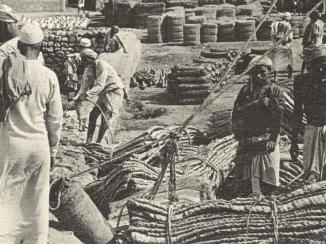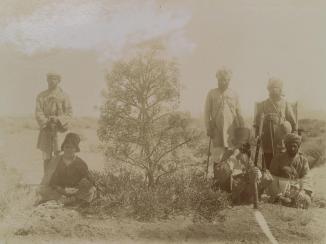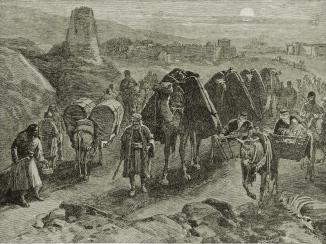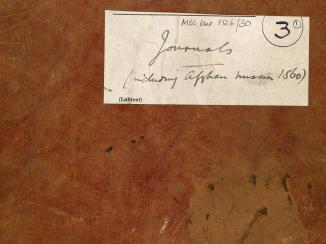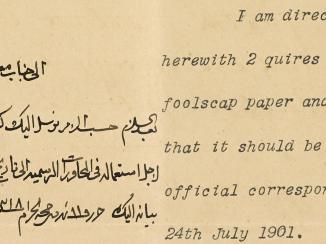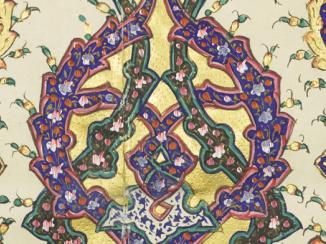Persian Affairs and Persian Gulf Affairs
IOR/L/PS/5/486, ff 59-134
152 items in this record
Search within this record
The record is made up of 1 item (76 folios). It was created in 16 Jan 1856. It was written in English. The original is part of the British Library: India Office The department of the British Government to which the Government of India reported between 1858 and 1947. The successor to the Court of Directors. Records and Private Papers Documents collected in a private capacity. .
About this record
- Content
This item comprises enclosures to a despatch from the Government of Bombay From c. 1668-1858, the East India Company’s administration in the city of Bombay [Mumbai] and western India. From 1858-1947, a subdivision of the British Raj. It was responsible for British relations with the Gulf and Red Sea regions. [Mumbai] Secret Department to the Secret Committee Pre-1784, the Committee responsible for protecting East India Company shipping. Post-1784, its main role was to transmit communications between the Board of Control and the Company's Indian governments on matters requiring secrecy. [Bombay Secret Letter], No. 8 dated 16 January 1856. The enclosures are dated 3-22 December 1855.
The item comprises copies of despatches, with relevant enclosures, from Charles Augustus Murray, HM Envoy in Persia [Iran], to the Earl of Clarendon, Secretary of State for Foreign Affairs, forwarded to the Government of Bombay From c. 1668-1858, the East India Company’s administration in the city of Bombay [Mumbai] and western India. From 1858-1947, a subdivision of the British Raj. It was responsible for British relations with the Gulf and Red Sea regions. and the Government of India, and from Commander James Felix Jones, Indian Navy, Acting Resident in the Persian Gulf The historical term used to describe the body of water between the Arabian Peninsula and Iran. , to the Secretary to the Government, Bombay.
Murray’s despatches relate to his suspension of diplomatic relations between the British Mission in Tehran and the Persian Government in connection with: the opposition of the Sadr Azim [Ṣadr-i Aʿẓam, Persian Prime Minister, spelled in various ways in this item] to Murray’s appointment of Meerza Hashem Khan [ Mīrzā A title of honour originally applied to princes, later to military leaders, and later still to secretaries, chieftains, and other ‘gentlemen’. Hāshim Khān] to the British Agency An office of the East India Company and, later, of the British Raj, headed by an agent. at Sheeraz [Shiraz]; the Sadr Azim’s imprisonment of Meerza Hashem Khan’s wife; and the ‘insults’ and ‘calumnies’ circulated by the Persian Government against Murray and other British officials in Tehran. Notably covered are:
- Murray’s assertion of the Sadr Azim’s excessive influence over the Shah
- The purported feud between the families of Meerza Hashem Khan and the Sadr Azim
- The Sadr Azim’s contention that there has never been a British Agent at Shiraz and that Meerza Hashem Khan was in the pay of the Persian Government and therefore ineligible for employment by the British
- Attempts by Nicolas Prosper Bourée, French Consul at Tehran, to mediate between Murray and the Persian Government
- Murray’s decision to haul down the flag of the British Mission in Tehran
- Murray’s vehement denial of Persian claims that both he and William Taylour Thomson, the former Chargé d’Affaires at the Court of Persia, had affairs with the wife of Meerza Hashem Khan (see ff 101-102, 103-106 and 116-117) and that Thomson originally took Meerza Hashem Khan under the protection and employment of the British Mission for this reason
- Murray’s refusal to rehoist the flag unless the Meerza’s wife is released and an apology is received from the Sadr Azim for the ‘gross and groundless’ ‘calumnies’ (f 98)
- Murray’s arrangements for the withdrawal the British Mission to Turkish [Ottoman] Territory, and (despite the opposition of the Persian Minister for Foreign Affairs) for HM Consul, Richard Stevens, to remain in Tehran
- The Persian Government’s insistence on its continued friendship with the British Government.
The despatches include copies of Murray’s correspondence with the Sadr Azim and the Minister for Foreign Affairs and copies of notes written by the Shah.
Also covered in Murray’s despatches are:
- Rumours of the death of Dost Mahomed Khan [Emir Dūst Muḥammad Khān Bārakzāy]
- Reports of the seizure of Herat by Prince Mahomed Yoosuf [Muḥammad Yūsuf Khān, Regent of Herat] and the apparent state of ‘civil war’ in Afghanistan (f 67)
- Intelligence from the British Agent at Meshed [Mashhad] relating the story of Hassan Ali Khan [Ḥasan ‘Alī Khān] in Bokhara [Bukhara] concerning his encounters with a man he suspects is a European [‘Perhaps Ferguson’ is noted in the left hand margin of folio 64]
- Russian incursions into the territory of the Khan of Khokand [Muḥammad Khudāyār Khān, Khān of Kokand]
- The Imam of Muscat’s letter asking Murray to mediate in his dispute with the Persian Government concerning ownership of Bender Abbass [Bandar Abbas].
Jones’s despatches cover his reaction to the news of the suspension of diplomatic relations between Britain and Persia, including his: concerns about the defences of Bushire [Bushehr] and a potential conflict there with Persia; communications with Commodore Richard Ethersey, Commanding the Indian Naval Squadron in the Persian Gulf The historical term used to describe the body of water between the Arabian Peninsula and Iran. , with regard to strengthening the squadron in the Bushire Roads to protect British subjects; and measures to establish good communications with Murray. Also included is a copy of a ruckum [ raqam Royal grants confirming specific trading privileges from the Shah of Persia. ] from HRH Prince Tamasp Meerza Prince Governor A Prince of the Royal line who also acted as Governor of a large Iranian province during the Qājār period (1794-1925). of Fars [Shāhzādah Ṭahmāsp/Ṭahmāsb Mīrzā A title of honour originally applied to princes, later to military leaders, and later still to secretaries, chieftains, and other ‘gentlemen’. Muʾayyid al-Dawlah], to the News Writer The lowest of the four classes into which East India Company civil servants were divided. A Writer’s duties originally consisted mostly of copying documents and book-keeping. and Agent for Foreign Affairs, Bushire, intimating he has no quarrel with the Resident.
- Extent and format
- 1 item (76 folios)
- It is part of
- 1014 imagesRef: IOR/L/PS/5/486
- Written in
- English in Latin script
- Type
- Archival item
Archive information for this record
- Original held at
- British Library: India Office The department of the British Government to which the Government of India reported between 1858 and 1947. The successor to the Court of Directors. Records and Private Papers Documents collected in a private capacity.
- Access conditions
Unrestricted
- Archive reference
- IOR/L/PS/5/486, ff 59-134
- Date(s)
- 16 Jan 1856 (CE, Gregorian)
Access & Reference
History of this record
Related search terms
- Subjects
- RumoursDetentionPolitical conflictsTerritorial disputesBilateral relationsDiplomacySecurity measuresMediation
- Places
- BokharaTehranPersian GulfAfghanistanBushire
- People & organisations
- Political ResidentMinister for Foreign AffairsGovernment of PersiaSecretary of State for Foreign AffairsShah of PersiaPrime Minister to the Shah of PersiaHM Ambassador to IranGovernment of BombayGovernment of IndiaGovernment of Bombay, Chief SecretaryNicolas Prosper Bourée
Use and share this record
- Share this record
- Cite this record in your research
Persian Affairs and Persian Gulf Affairs, British Library: India Office Records and Private Papers, IOR/L/PS/5/486, ff 59-134, in Qatar Digital Library <https://www.qdl.qa/archive/81055/vdc_100129828683.0x000007> [accessed 5 July 2024]
- Link to this record
https://www.qdl.qa/en/archive/81055/vdc_100129828683.0x000007
- IIIF details
This record has a IIIF manifest available as follows. If you have a compatible viewer you can drag the icon to load it.https://www.qdl.qa/en/iiif/81055/vdc_100000000319.0x00012d/manifestOpen in Universal viewerOpen in Mirador viewerMore options for embedding images
Copyright: How to use this content
- Reference
- IOR/L/PS/5/486, ff 59-134
- Title
- Persian Affairs and Persian Gulf Affairs
- Pages
- 72r:72v, 73v:74r, 79r:86v, 89r:89v, 91r, 101r:102v
- Author
- Eʿtemād al-Dawla, Mīrzā Āqā Khan Nūrī, Ṣadr-i Aʿẓam
- Usage terms
- The copyright status is unknown. Please contact [email protected] with any information you have regarding this item.
- Reference
- IOR/L/PS/5/486, ff 59-134
- Title
- Persian Affairs and Persian Gulf Affairs
- Pages
- 93r:93v
- Author
- Āl Bū Sa‘īd, Sayyid Sulṭān bin Ahmad
- Usage terms
- The copyright status is unknown. Please contact [email protected] with any information you have regarding this item.
- Reference
- IOR/L/PS/5/486, ff 59-134
- Title
- Persian Affairs and Persian Gulf Affairs
- Pages
- 107r:108r, 114r:116r
- Author
- Ansari, Mirza Saeed Khan
- Usage terms
- The copyright status is unknown. Please contact [email protected] with any information you have regarding this item.
- Reference
- IOR/L/PS/5/486, ff 59-134
- Title
- Persian Affairs and Persian Gulf Affairs
- Pages
- 108r:109r, 116r:117v
- Author
- Qājār, Naser al-Din Shah
- Usage terms
- Public Domain
- Reference
- IOR/L/PS/5/486, ff 59-134
- Title
- Persian Affairs and Persian Gulf Affairs
- Pages
- 125r:125v
- Author
- Shāhzādah Ṭahmāsb Mīrzā, Muʾayyid al-Dawlah xx Shāhzādah Ṭahmāsp Mīrzā, Muʾayyid al-Dawlah
- Usage terms
- The copyright status is unknown. Please contact [email protected] with any information you have regarding this item.
- Reference
- IOR/L/PS/5/486, ff 59-134
- Title
- Persian Affairs and Persian Gulf Affairs
- Pages
- 59r:71v, 73r, 74v:78v, 87r:88v, 90r:90v, 91v:92v, 94r:100v, 103r:106v, 109v:113v, 118r:124v, 126r:134v
- Author
- East India Company, the Board of Control, the India Office, or other British Government Department
- Usage terms
- Open Government Licence
























































































































































